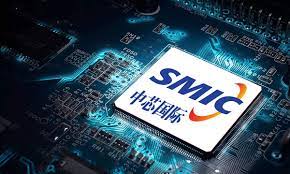
According to Counterpoint Research, SMIC, the largest chipmaker in China, ranked third globally in terms of sales during the first quarter of 2018.
Semiconductor Manufacturing International Co., a state-sponsored company, increased its market share to 6% in the first quarter of this year from 5% the previous year, according to the study. It passed Taiwan's United Microelectronics Corporation and GlobalFoundries.
With 62% and 13% of the market share in the first quarter, respectively, Taiwan Semiconductor Manufacturing Company and Samsung Foundry, based in South Korea, are the only companies SMIC trails behind.
“SMIC’s quarterly results surpassed market expectations, and the company secured the No. 3 position in foundry revenue market share in Q1 2024 for the first time, as demand recovery begins in China, including CIS, PMIC, IoT, and DDIC applications,” showed the Counterpoint Research report published recently.
SMIC chips are used in computers, cellphones, cars, Internet of Things devices, and more.
Due to consumers stockpiling chips, SMIC reported first-quarter sales of $1.75 billion, up 19.7% from the same period last year. The company stated in its quarterly report that clients in China accounted for more than 80% of its sales during the quarter.
Due to robust demand, the Chinese company anticipates that sales will rise by 5% to 7% in the second quarter compared to the first.
China is the world's largest consumer device assembly market, accounting for roughly 50% of global semiconductor consumption, according to statistics from tech consultant Omdia.
As the U.S. seeks to curtail China's tech prowess, SMIC is considered as essential to Beijing's goals of lowering reliance on foreign technology in its domestic chip industry. Beijing has poured billions of yuan in subsidies into its semiconductor companies to support homegrown manufacture.
Since 2020, SMIC has been the focus of U.S. sanctions, which limit its access to some U.S. technologies and require American companies to seek for a licence before they may sell to SMIC.
Additionally, it has not been able to acquire the intense ultraviolet lithography equipment, which are manufactured only by the Dutch company ASML. SMIC is unable to manufacture high-tech semiconductors at reduced costs or on a wide scale without EUV equipment.
The Mate 60 Pro smartphone, which was introduced last year and was developed by Chinese tech giant Huawei, was found to be powered by a SMIC 7-nanometer processor, which dealt a blow to US sanctions. It also looks like the smartphone supports 5G connection, even though the US is trying to ban Huawei from important technology, such as 5G processors.
Analysts noted that SMIC is still behind TSMC and Samsung Electronics.
The more modern and efficient the chip, the lower the nanoscale size; TSMC and Samsung began mass manufacturing 7-nanometer circuits in 2018 and are presently making 3-nanometer chips.
(Source:www.scmp.com)
Semiconductor Manufacturing International Co., a state-sponsored company, increased its market share to 6% in the first quarter of this year from 5% the previous year, according to the study. It passed Taiwan's United Microelectronics Corporation and GlobalFoundries.
With 62% and 13% of the market share in the first quarter, respectively, Taiwan Semiconductor Manufacturing Company and Samsung Foundry, based in South Korea, are the only companies SMIC trails behind.
“SMIC’s quarterly results surpassed market expectations, and the company secured the No. 3 position in foundry revenue market share in Q1 2024 for the first time, as demand recovery begins in China, including CIS, PMIC, IoT, and DDIC applications,” showed the Counterpoint Research report published recently.
SMIC chips are used in computers, cellphones, cars, Internet of Things devices, and more.
Due to consumers stockpiling chips, SMIC reported first-quarter sales of $1.75 billion, up 19.7% from the same period last year. The company stated in its quarterly report that clients in China accounted for more than 80% of its sales during the quarter.
Due to robust demand, the Chinese company anticipates that sales will rise by 5% to 7% in the second quarter compared to the first.
China is the world's largest consumer device assembly market, accounting for roughly 50% of global semiconductor consumption, according to statistics from tech consultant Omdia.
As the U.S. seeks to curtail China's tech prowess, SMIC is considered as essential to Beijing's goals of lowering reliance on foreign technology in its domestic chip industry. Beijing has poured billions of yuan in subsidies into its semiconductor companies to support homegrown manufacture.
Since 2020, SMIC has been the focus of U.S. sanctions, which limit its access to some U.S. technologies and require American companies to seek for a licence before they may sell to SMIC.
Additionally, it has not been able to acquire the intense ultraviolet lithography equipment, which are manufactured only by the Dutch company ASML. SMIC is unable to manufacture high-tech semiconductors at reduced costs or on a wide scale without EUV equipment.
The Mate 60 Pro smartphone, which was introduced last year and was developed by Chinese tech giant Huawei, was found to be powered by a SMIC 7-nanometer processor, which dealt a blow to US sanctions. It also looks like the smartphone supports 5G connection, even though the US is trying to ban Huawei from important technology, such as 5G processors.
Analysts noted that SMIC is still behind TSMC and Samsung Electronics.
The more modern and efficient the chip, the lower the nanoscale size; TSMC and Samsung began mass manufacturing 7-nanometer circuits in 2018 and are presently making 3-nanometer chips.
(Source:www.scmp.com)





